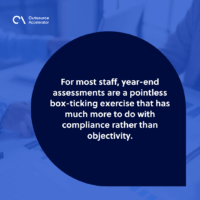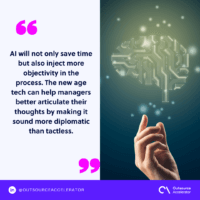AI-assisted reviews
Banking and financial services holding firm JPMorgan Chase has allowed its employees to use its proprietary artificial intelligence (AI) platform to assist with year-end performance reviews.
Professionals from various industries worldwide welcomed the initiative as they regard annual evaluations as time-consuming, biased, and having no bearing on future performance.
For most staff, year-end assessments are a pointless box-ticking exercise that has much more to do with compliance rather than objectivity. Some managers gloss over poorly constructed performance forms and give little thought to what they tick or write.
On the other hand, junior employees dislike the fact that their future may depend on a single high-stakes event. Some of them view criticism — whether constructive or not — as an insult to their habits. This only creates tension in the workplace and hurts morale.
Sit-down dialogue
AI will not only save time but also inject more objectivity in the process. The new age tech can help managers better articulate their thoughts by making it sound more diplomatic than tactless. A well-designed system can enhance quality and prevent highly critical reviews. Additionally, large language models could help in the structuring of these assessments.
Integrating AI into this much-loathed process is a great way to remove the stigma surrounding it — but there’s more to be done. Some firms worldwide have reduced subjectivity by implementing quarterly reviews instead of annual ones. This provides more detailed insight, reduces recency bias, and fosters stronger, more meaningful relationships.
Also, employees would prefer to turn these evaluation sheets into a real dialogue. It should be a two-way street — not a lecture from a manager. The goal of assessments is to gather feedback and determine what is working and what is not. This process ensures that employees’ career goals are aligned with the company’s objectives.
Seamless communication
Introducing AI into the assessment process doesn’t mean it’s a low-value task. The activity falls under communication and is one of the most important skills managers and staff must have. AI is there to make things a bit easier, but the responsibility of delivering a clear and succinct message belongs to the human professional.
Feedback should be as specific as possible to avoid confusion. Whether positive or negative, it should be communicated directly and professionally. One should not beat around the bush.
Critically, assessments should focus on the output and the work itself, rather than the individual’s personality. Everyone in the team strives to be better than they were yesterday. Following proper feedback etiquette could turn a low-performing employee into a good one. The more engaged employees a company has, the better it is.
The question for your business
How do your managers and employees manage reviews?




 Independent
Independent





















